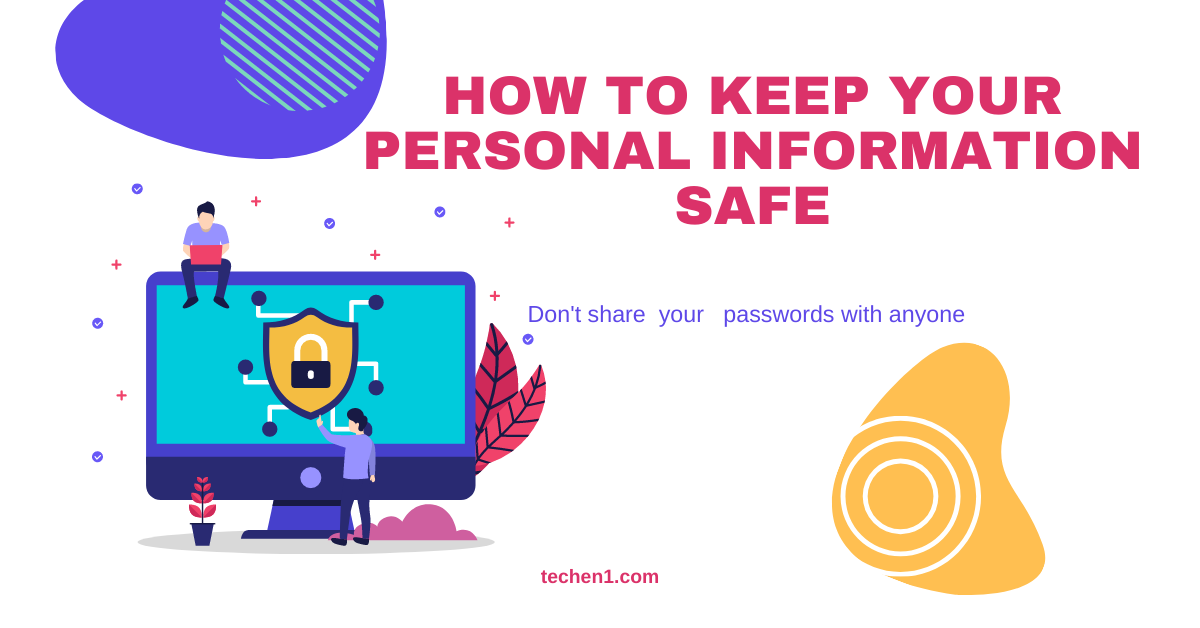10 Ways to Keep Your Personal Information Safe
A lot of people overlook cyber security in their daily lives because they don’t realize how much it affects them on a day-to-day basis. Since the dawn of the internet, hackers have grown more and more sophisticated, and it’s no longer enough to protect your information with nothing but common sense – you need to be digitally secure as well. This article offers ten simple ways to protect your personal information online, from the password you use to the company you choose to do business with.
Use a Password Manager
Password managers and vaults generate, remember, and securely store your passwords so you don’t have to. They also protect your other sensitive information—like credit card data—so you don’t have to write it down yourself. Not only is that unsafe, but it can lead to accidentally exposing more information than you mean to on social media or by emailing documents you didn’t intend to share.
Encrypt Everything
With more and more sensitive data being stored in digital form, from work files to personal information, it’s important that you use encryption on your electronic devices. If someone were able to get their hands on your smartphone or laptop, they could access all sorts of confidential data—the last thing you want is for it getting into an unintended pair of hands. If your device uses a password, make sure you set up a good one (more than 8 characters) that includes symbols and uppercase letters.
Add Two-Factor Authentication
Two-factor authentication adds an extra layer of security to your logins. Services like Google or Dropbox will send you a text message with a special code every time you try to log in, making it much harder for someone else to break into your account. (If you want more information on how two-factor authentication works, here’s a good place to start.)
Update Software and Apps
Updating software helps protect your computer and personal information. It’s also a good idea to occasionally review which apps you have on your devices and how they are used. If there is an app that you don’t use often, consider deleting it. Look into cloud-based storage for important documents rather than keeping them on your laptop or desktop computer—thereby minimizing risk should they be stolen
Avoid Torrents
They’re dangerous for a number of reasons. They’re usually full of spam, malware, and/or viruses that could destroy your computer or smartphone if you aren’t careful. Additionally, people often download copyrighted content from torrents, which is illegal in many countries. If you use them a lot, it might be best to use a VPN service (virtual private network) so your activity is hidden from prying eyes.
Watch What You Post on Social Media
Social media is a blessing and a curse. While it allows us to connect with people we otherwise may never have been able to reach, it also makes it easy for anyone in your social circle—or even someone you’ve never met—to steal your identity or turn up lost photos of you that could be used against you. When posting on social media, be smart about what you post and how much personal information you give away.
Use HTTPS Everywhere on the Web
HTTPS Everywhere encrypts your communications with many major websites, making it more difficult for third parties to snoop on your information or inject malware into your connection. You’ll know you’re using HTTPS Everywhere if you see a little lock icon in your browser bar and/or https:// in front of a website’s URL address.
Protect Devices with VPN or SSH Proxy
Whether you’re using a laptop or a smartphone, your device is essentially an extension of yourself. If someone has access to your computer, they can gain access to your personal information and any files you have stored on it. When traveling for work or pleasure, be sure to use an SSH proxy when connecting through insecure networks like those in coffee shops or hotels. An SSH (secure shell) proxy allows you to connect securely and encrypt data transmitted between your computer and servers.
Don’t Click Suspicious Links or Attachments
Phishing is a criminal practice of sending e-mails, text messages, and other messages that appear legitimate in order to trick you into clicking on a link or opening an attachment. The end result? They access your personal information and use it for their own gain. In many cases, phishing will lead you straight to a fake website posing as your bank, credit card company, or another site asking for sensitive information such as passwords and account numbers.
Learn as Much as You Can About VPN, SSH, Public WiFi Etc.
In recent years, cyber attacks and security breaches have become increasingly commonplace. This means that your information is under attack at all times. One of your best defenses against these threats is a good offense: Learn as much as you can about public wifi safety, encryption and other ways to keep yourself protected online.

